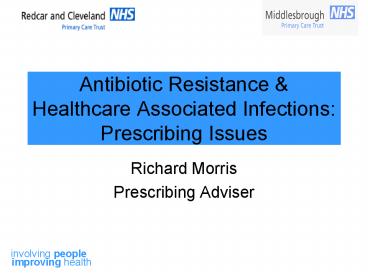Antibiotic Resistance - PowerPoint PPT Presentation
1 / 33
Title:
Antibiotic Resistance
Description:
NNT (otitis media) = 71 NNT (quinsy) = 50. 0.18 0.41. 0.27. Rheumatic fever. 0.07 0.35 ... Quinsy. 0.11 0.43. 0.22. Otitis media. 95% CI. Odds ratio ... – PowerPoint PPT presentation
Number of Views:157
Avg rating:3.0/5.0
Title: Antibiotic Resistance
1
Antibiotic Resistance Healthcare Associated
InfectionsPrescribing Issues
- Richard Morris
- Prescribing Adviser
2
Aims objectives
- Aim
- To raise awareness of the association between
unnecessary or inappropriate antibiotic
prescribing and the incidence of bacterial
resistance and health care associated infections. - Objectives
- To explain the drivers for controlling antibiotic
prescribing in primary care - To illustrate current antibiotic prescribing
rates across Middlesbrough and Redcar Cleveland
PCTs - To cascade the key messages of recent NICE
guidance on the management of respiratory tract
infections - To discuss the evidence for strategies that may
be employed in general practice to reduce
antibiotic prescribing rates
3
Question 1
- Antibiotic resistance is a major threat to public
health - AGREE
4
Antibiotic resistance
5
Question 2
- High antibiotic prescribing will result in high
antibiotic resistance - AGREE
6
(No Transcript)
7
- HOWEVER..
8
(No Transcript)
9
PCT Prescribing RatesApril-August 2008 (c.f.
2007)
10
Question 3
- Ciprofloxacin resistance in Neisseria gonorrhoea
has doubled in the last 5 years - DISAGREE
11
Question 4
- How much more likely is it that a patient will
acquire MRSA if they have taken ciprofloxacin in
the last 4 months - Less likely
- No more likely
- Twice as likely
- 3 times as likely
12
Quinolone prescribing audit
- Audit of prescribing in June 2008
- 8 practices 4 in each PCT area
- Total list size 58,730
- Mean 7,341 (3,081 13,512)
- Standards
- prescribing in line with PCT Community Infection
Guidance (January 2008) - prescribing in line with HPA Management of
Infection Guidance (June 2008) - prescribing in response to ve CS result
13
Results
- 107 prescriptions identified (in 104 patients)
- 105 for ciprofloxacin
- 2 for ofloxacin
- Practice prescribing rates (items/1000pts)
- Highest 3.46
- Lowest 0.48
- Mean 1.82
14
(No Transcript)
15
(No Transcript)
16
(No Transcript)
17
(No Transcript)
18
Bottom line
- Quinolones increase the risk of C.diff, MRSA
multi-drug resistant infections - Avoid quinolones when narrower spectrum
antibiotics are likely to be effective - Reserve quinolones for
- Indications for which they are recommended in
local or national prescribing guidance - Proven bacterial infections where cultures have
demonstrated sensitivity to a quinolone
antibiotic only
19
Question 5
- Using antibiotics in throat infections
significantly reduces complications - DISAGREE
20
Complications from sore throatMeReC Bulletin
2006 17(3) 12-14
- Cochrane review demonstrated reduced
complications - However.
- No consideration of adverse effects or patient
harms - Incidence of rheumatic fever has fallen
significantly over time - Complication rates are low, therefore absolute
benefit is small - NNT (otitis media) 71 NNT (quinsy) 50
21
Questions 6 7
- 80 of children presenting with otitis media
resolve without antibiotic treatment - AGREE
- Using antibiotics in otitis media prevents glue
ear - DISAGREE
22
Antibiotics for AOMONeill et al. Clinical
Evidence 2006
- Without antibiotics..
- 60 symptomatic improvement within 24 hours
- 80 resolve in about 3 days
- Serious complications are rare in otherwise
healthy children (0.12) - Paracetamol (NNT6) and ibuprofen (NNT5) are
effective at relieving earache after 2 days
23
Antibiotics for AOMGlasziou PP et al. Cochrane
Review 2006
- With antibiotics
- 7 extra patients will gain pain relief at 2-7
days (no effect at 24 hours) - BUT
- 6 extra patients will suffer harm (diarrhoea,
vomiting, rash) - Cannot predict which individuals will benefit
- lt2 year olds may benefit more
24
(No Transcript)
25
(No Transcript)
26
Question 8
- There is good evidence that patient information
leaflets reduce further consultation rates for
acute cough - AGREE
27
PILs for acute coughMacfarlane J et al. BMJ
1997 315 1206-10
- Fewer patients who received a PIL returned to
surgery (NNT 15), regardless of whether an
antibiotic was prescribed - PCT can provide PILs on management of chesty
coughs, sore throat ear infections
28
Question 9
- Using a delayed prescription tactic may
effectively reduce antibiotic prescribing in a
population - AGREE
29
- NICE Clinical Guideline 69
30
NICE CG69 recommendations (1)
- No antibiotic or delayed Rx for
- Otitis media
- Acute sore throat / pharyngitis / tonsillitis
- Common cold
- Acute rhinosinusitis
- Acute cough / bronchitis
- No antibiotic, delayed Rx or immediate Rx
depending on severity for - Children lt2 years with bilateral AOM
- Children with otorrhoea associated with AOM
- Acute sore throat / pharyngitis / tonsillitis and
3 Centor criteria
31
NICE CG69 recommendations (2)
- Immediate Rx or further investigation if
- Systemically unwell
- Symptoms signs of serious illness or
complications - High risk of serious complications due to
pre-existing morbidity - Over 65 with acute cough and 2, or over 80 and
1, of the following - Hospitalisation in previous year
- Diabetes mellitus (type 1 or 2)
- History of congestive heart failure
- Current use of oral glucocorticoids
- Offer all patients advice re. natural history
average length of illness
32
Take home messages (and gifts)
- Quinolones increase the risk of C.diff, MRSA
multi-drug resistant infections - Most RTIs are self-limiting and do not require
antibiotic treatment - Delayed prescription stamps
- PILs
- Sticky pads, good bugs
33
- Thank you!Any questions??
- Richard.morris_at_middlesbroughpct.nhs.uk
- Richard.morris2_at_nhs.net
- 01642 352839

